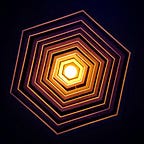You’re not what You think You are
We’re not what we think we are.
This isn’t what it’s thought to be.
There’s a hidden poetry to things, written in a universal language. They connect in ways that are obscured from plain sight. Those links make no sound and defy reason. Stretching like invisible spiderwebs, unforseen till the moment of revelation when they tickle you on the cheek ever so lightly.
Just as an orchard whose order is revealed only from a narrow set of angles, the poetry of reality doesn’t jump on you like a horny poodle. The verses are unforced, written in the lightest ink of a passive pen. Their rhyme and reason are not served on a silver platter — they are revealed through a process so painful and grueling that many have given up their lifes for peeling even the slightest layer of the epic that scribes life.
To be, or not to be: that is the question.
The poetry of being is written in a language that nobody can speak but everybody can understand. How is such a paradox possible? How can it be, that the difference between passion and addiction is an ephemeral glimmer in the eye? How can it be, that the most powerful things are the most dangerous? How can it be, that tolerance breeds hatred and hatred breeds tolerance; that peace breeds violence and violence breeds peace; that love breeds war and war breeds love?
The reality, my friend, is a paradox.
To a child, everything is simple. Things are simply what they are, and the consequences of any action are short-ranged and benign. As we mature (what a word!) by absorbing the complexity of the world, things that we deemed immutable grow completely out of their proportions. Slowly but surely, it is revealed to us that even mundane objects are fantastic beings with serendipitously intertwined stories. (Think rocks are boring? What about space rocks? What about the rock in your grandmother’s ring? What about kidney stones? What about corals?) Through the process of losing innocence, even the strongest individuals are bound to stray from their righteous paths and become heretics to the idea that everything makes sense.
In some cases, that conflicting proof of intherent duality of things becomes external. “How can all these reasonable and intelligent people become bloodthirsty political opponents, yet claim that their interests are the same and good?” Other times, the struggle is internal, and everybody who has ever made a tough choice has tasted the blood on the sword’s edge. If knowledge is to help us decide complex problems, how come that it often makes things harder?
The answer is singular: everything, but really everything, contains a logical contradiction. You just need to dig deep enough. Follow the lead, and you’ll reach a conflict — a point where all properties of a single thing start speaking against each other — a paradox. So the answer is: there’s no single answer. A paradox.
You think something is trivial? Well, can you prove it? You can try, but eventually you reach the rock bottom: somewhere down the line, you made a decision — decided that some basic thing is significant, or some complex thing is trivial, and built on that. You pushed yourself from that rock bottom and floated upwards to reach the light of the day. But that rock bottom, that solid slab, is only an invention, is virtual: stop believing and it vanishes, revealing new depths that in their gaping darkness stand as a testament, or a threat, or an invitation.
The inherent relativity of things is known to mathematitians, to philosophers, to poets, and all other madmen who dare to ask too many questions. Yet none of these people will give you a concrete and useful answer, because the only such answer is: there’s is no single answer. Nor will I give you one. The only way to perceive the unity present in everything is to experience it, to feel it. Right there, in the moment, where life happens without care or design. So go out there my friend, go and and live to the fullest.
